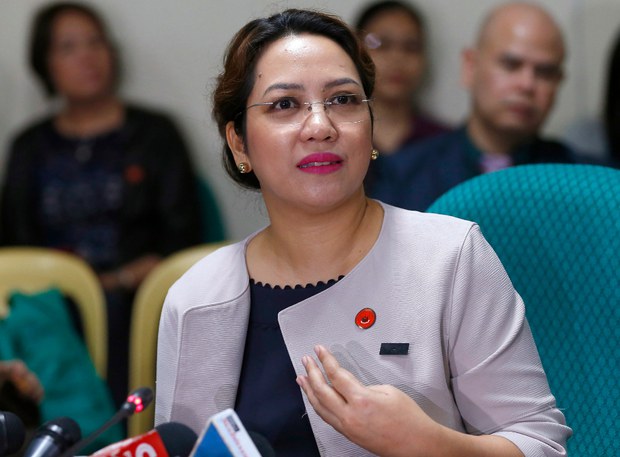Ex-Philippine Health Chief, 9 Others Indicted in Deaths During Anti-Dengue Drive
2020.02.21
Davao, Philippines
 Former Philippine Health Secretary Janette Garin testifies in Pasay City during a Philippine Senate probe into the controversial anti-Dengue vaccine Dengvaxia, which was administered to more than 830,000 school children and adults as part of the government's Dengue immunization program, Dec. 11, 2017.
Former Philippine Health Secretary Janette Garin testifies in Pasay City during a Philippine Senate probe into the controversial anti-Dengue vaccine Dengvaxia, which was administered to more than 830,000 school children and adults as part of the government's Dengue immunization program, Dec. 11, 2017.
Philippine prosecutors have indicted an ex-health minister and nine other people over the deaths of at least a dozen schoolchildren who were given the anti-dengue drug Dengvaxia as part of a government immunization drive against the mosquito-born disease, officials said.
Former Health Secretary Janette Garin, now a member of the House of Representatives, and the others were charged with “reckless imprudence resulting in homicide,” according to a 127-page document made public by the Philippine Department of Justice on Friday.
The nine others include officials from the Philippine health department, Food and Drug Administration, the Research Institute for Tropical Medicine, as well as executives from Sanofi Pasteur, the French firm that designed and manufactured Dengvaxia, which has been banned in the Philippines.
Prosecutors with the justice department said they found that Garin and the others had exhibited “inexcusable lack of precaution and foresight” when they quickly facilitated “the registration and purchase of Dengvaxia.”
When contacted for comment on Friday, Garin said she had not yet received a copy of the indictment, but she insisted that the vaccine was a “life-saving vaccine” in a country that has long grappled with dengue.
“I will face this head on because I know the truth,” Garin told BenarNews, adding that the courts had earlier thrown out six similar cases against her for “lack of basis and substance.”
“Science has proven over and over again that no deaths have been linked to the Dengvaxia vaccine,” she said. “Almost the whole world is using it now and no case like ours has surfaced.”
The government ordered the use of Dengvaxia, the first commercially-available anti-dengue drug, stopped in December 2017 after nearly 800,000 elementary school students had received the vaccine as part of a nationwide inoculation program. At least 14 boys and girls died after being given Dengvaxia during the campaign from 2016 to 2017, officials said, though experts did not rule conclusively that the drug was the cause.
The Philippines was the first country in Southeast Asia where Dengvaxia was publicly released. Then-President Benigno Aquino III approved its release before he stepped down in 2016.
The government of his successor, Rodrigo Duterte, banned the drug after Sanofi revealed that clinical tests had shown that the vaccine worked well with those who had already been “previously infected” with dengue.
However, the French drug manufacturer warned at the time, for those not previously infected by the virus, “the analysis found that in the longer term, more cases of severe disease could occur” after vaccination. Sanofi said it would clearly label the new finding on vaccine containers.
But since the drug was taken off the shelves, dengue infections and deaths have risen sharply in the Philippines. In July 2019, the health department reported a 250 percent increase in cases from 2018. Nearly a 100 people have also died in that same period, most of them in the central Philippine islands, health officials said.
Garin said what was deplorable was allowing more deaths because the only drug that could have stopped dengue had been banned in the Philippines. After the dengue vaccine scare, many other families have shied away from having their children injected with other drugs, leading to a spike in measles and a resurgence of polio here, she said.
“In this situation, real justice is listening to science rather than politicking,” Garin said, referring to her detractors.
Jojo Rinoza contributed to this report from Dagupan City, Philippines.







